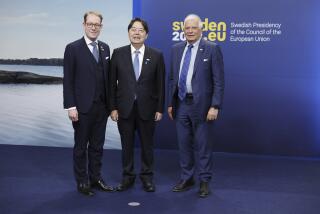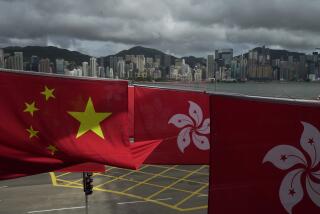Japan’s Education Chief Reopens Textbook Rift
- Share via
TOKYO — Masayuki Fujio, the Japanese minister of education, criticized China and South Korea on Tuesday for attacking a Japanese textbook that glosses over Japan’s wartime history. At the same time, he charged that the United States distorted Japanese tradition with its postwar occupation policy.
Fujio, speaking at the Japan National Press Club, said his country has been subjected to aggression by other countries and cited as an example Mongolian attempts to invade Japan in the 13th Century.
He said the attempts were undertaken by “Mongolians--Chinese, who passed through the Korean Peninsula.”
Fujio stirred a storm of protest from China and South Korea when he said at a press conference on July 25 that people who are complaining about Japanese aggression “should look at their own history to see if they have not done such things themselves.”
The storm was quieted by diplomatic apologies and explanations that Fujio was not referring to the Chinese or the South Koreans by his use of the pejorative yatsu , which dictionaries translate as “creeps,” or “loathsome fellows” or just “guys.”
But on Tuesday, Fujio specifically mentioned both China and Korea in connection with the Mongolian attempts to invade Japan, and again he used the word yatsu .
He said that actions “by various Western countries in the Western Pacific and against India, Indochina, Hong Kong and China were all clearly aggression.” World history, he said, “is the history of aggression, the history of wars.”
“I believe,” Fujio said, “that the mistaken view of history that (other nations) committed no aggression and that only Japan engaged in aggression must be corrected. Most countries have aggression in their histories. Some even now are engaging in aggression. We (Japanese) must have the courage to appreciate correct criticisms made of us, but we have no need to cling timidly to the way of thinking that only we Japanese among all peoples of the world have done bad things.
“The things we did that were bad, we should call bad. It is only natural that we should make efforts to correct these errors. But as a people we have no need to crouch down in shame or debase ourselves in the context of overall world history just because we are criticized.”
Fujio said there was much merit in the U.S. occupation after World War II, including “freedom, democracy and trust from foreign countries.” But he went on to say:
“As seen in the Potsdam Declaration (calling for Japan’s unconditional surrender), the occupation policy and the Tokyo (war crimes) trials, basic Allied policy was to never again allow Japan to become a country that would be the cause of an international conflict. That was a big objective. To achieve it, they had to prevent the Japanese people from growing and developing or strongly solidifying.”
As an example of the effort to prevent the Japanese people from “solidifying,” Fujio cited the occupation policy banning display of the Japanese rising sun flag and the playing of the national anthem.
“Through the occupation policy, the Potsdam Declaration and the Tokyo trials, the foundations of Japan were warped,” he said. “This cannot be denied. Today’s politicians and today’s education system have not studied or corrected this. Bringing back the things that have been missing must become the basis of our education policy. Displaying the rising sun flag must become a fundamental point of Japanese education.”
Failure to display the Japanese flag at schools and at homes on national holidays, Fujio said, is “devastation of the heart, and it must be corrected.”
When a Japanese reporter remarked that he feels “no devastation of the heart” even though his family, like most, does not display the rising sun flag on holidays, Fujio retorted, “I’m sorry, but I think you do not qualify to be a Japanese.”
Fujio said that Prime Minister Yasuhiro Nakasone and members of his Cabinet should pay their respects to the war dead at the Yasukuni Shinto shrine on Friday, the anniversary of Japan’s surrender in World War II. He said they should not worry about foreign criticism on this score.
“At least once a year we should pay our respects to those who sacrificed their lives for the country and, at the same time, commemorate world peace,” he said. “Even debating it is strange.”
Fujio said that if Nakasone fails to pay his respects at the shrine Friday, it will lead foreigners to “misunderstand our position” and expose “the clumsiness of our diplomacy.”
More to Read
Sign up for Essential California
The most important California stories and recommendations in your inbox every morning.
You may occasionally receive promotional content from the Los Angeles Times.













